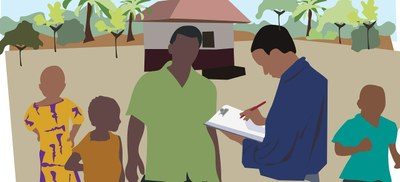A Word on Verbal Autopsy: Measuring malaria deaths in the developing world
 Accurate data on malaria mortality is essential for effective policymaking and program planning. Yet, valid and reliable data on malaria deaths is lacking, especially in endemic countries that bear the greatest burden.
Accurate data on malaria mortality is essential for effective policymaking and program planning. Yet, valid and reliable data on malaria deaths is lacking, especially in endemic countries that bear the greatest burden.
Recording an accurate cause of death is challenging for many reasons: incomplete statistics on live births, deaths, and fetal deaths in most low- and middle-income countries; difficulty in clinical assessment of malaria; and most malaria deaths occurring outside of the formal health care system.
“Children in malaria-endemic countries are dying outside the health care system,” says Yazoumé Yé, a technical director in charge of the malaria portfolio at MEASURE Evaluation, a project funded by the U.S. Agency for International Development. “There’s no consistent way to know what causes their death.”
To address this measurement gap, the World Health Organization developed a verbal autopsy method to determine cause of death at the population level. Verbal autopsy consists of an interview with a family member or individual familiar with the deceased person. The interview uses a structured questionnaire to gather information about signs and symptoms of illness, their duration, and the events leading up to death. The cause of death is assigned either directly by a trained physician or automated methods.
Verbal autopsy is a valuable interim method for cause of death data as countries work toward improving their vital statistics registration systems. Despite verbal autopsy’s wide use, it has limitations, primarily its low sensitivity to death by malaria.
Yé and his colleagues recently assessed the strengths and limitations of measuring malaria mortality through verbal autopsy. They reviewed literature to document how verbal autopsy has been used to measure malaria mortality and are now proposing ways to improve the method. “Verbal autopsy asks questions about death in general,” says Yé. “We need to adapt the existing method to include more malaria-specific indicators to improve specificity.”
The global malaria community is defining strategies for improving cause of death data, through better verbal autopsy tools and stronger vital statistics registration systems. Capturing accurate data is crucial for assessing the malaria situation and effectively using resources to reduce its public health impact.












